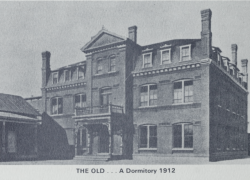Difference between revisions of "Montana State Hospital"
(→Cemetery) |
|||
| (One intermediate revision by one other user not shown) | |||
| Line 41: | Line 41: | ||
File:montana4.png | File:montana4.png | ||
File:montana8.png | File:montana8.png | ||
| + | File:warmspringsMT002.jpg | ||
</gallery> | </gallery> | ||
==Cemetery== | ==Cemetery== | ||
| − | + | There are currently 3317 burials noted in the asylum cemetery, a minority of them being marked and fewer still having their names noted on the markers. Most of those listed on Find a Grave were posted from online death certificates which date to 1907. Therefore at least three decades of burials are largely unrecorded in the Find a Grave listing and will remain unknown unless Montana State Hospital has a listing and will make it known. The number of burials in the asylum cemetery would then likely swell to at least 3600. | |
[[Category:Active Institution]] | [[Category:Active Institution]] | ||
[[Category:Cottage Plan]] | [[Category:Cottage Plan]] | ||
Latest revision as of 03:40, 24 May 2024
| Montana State Hospital | |
|---|---|
 | |
| Established | 1877 |
| Construction Began | 1877 |
| Opened | 1912 (purchased by the state) |
| Current Status | Active |
| Building Style | Cottage Plan |
| Location | Warm Springs, MT |
| Peak Patient Population | 1,936 in 1955 |
| Alternate Names |
|
History[edit]
Prior to 1869, Montana Territory made no special provisions for mental patients, their care generally being left to regular hospitals. The Helena Weekly Herald in a September 19, 1867, article on the county hospital commented on the need for a territorial insane asylum, stating that the county hospital was not the proper place for a "lunatic."
Two years later the 6th Territorial Legislative Assembly passed a law authorizing an official territorial insane asylum to be owned and managed on a contract basis by private parties. A board of commissioners was established with one representative from each judicial district to oversee the asylum, establish rules for its operation, and perform periodic inspections. Until 1877 St. John's Hospital in Helena served as the territorial asylum. By 1874 it was accepting sufficient numbers of patients committed by Governor Benjamin Potts to require the construction of a separate building behind the main hospital.
In 1877 Drs. Armistead H. Mitchell (1831-1898) and Charles F. Mussigbrod (d.1893), owners of a hotel and spa at Warm Springs, Montana, were awarded the contract for the care of the territory's mental patients. By 1886 the partners had expanded their operation from 160 acres to 1640 acres and from two buildings to thirty-two buildings, including a larger hotel, a house for convalescents, a separate building for violent patients, a large plunge pool, a laundry, storehouses, icehouses, and many other outbuildings. From 1891 to 1907 the hospital was run by Dr. O.Y. Warren, who was in turn succeeded by Dr. J.M. Scanland, son-in-law of Dr. Mitchell. Under private operation, the asylum continued to operate the hotel and run a large farm, specializing in pedigreed cattle.
In 1910 a constitutional amendment was passed allowing the state to acquire the asylum. Negotiations were begun and on December 1, 1912, the Warm Springs hospital became a state institution. Dr. Scanland continued as superintendent. In 1917 the governor appointed a special commission to investigate charges of gross mismanagement and corruption at the hospital. The hospital management was exonerated of all charges. Gradually under state operation the emphasis changed from a custodial asylum to a hospital, as more modern procedures were adopted, but efforts were hampered by low funding. Care costs in 1938 of $.60 per day per patient were the lowest in the nation. As concepts of treatment of mental patients changed, the average patient load dropped dramatically from a high of over 1900 in the early 1950s to 1112 in 1972. Numbers of admissions per year were higher, but average length of stay was much shorter.
Images of Montana State Hospital[edit]
Main Image Gallery: Montana State Hospital
Cemetery[edit]
There are currently 3317 burials noted in the asylum cemetery, a minority of them being marked and fewer still having their names noted on the markers. Most of those listed on Find a Grave were posted from online death certificates which date to 1907. Therefore at least three decades of burials are largely unrecorded in the Find a Grave listing and will remain unknown unless Montana State Hospital has a listing and will make it known. The number of burials in the asylum cemetery would then likely swell to at least 3600.




